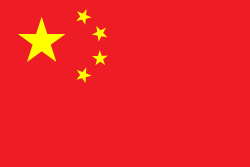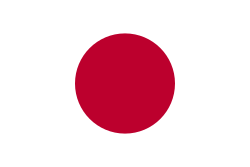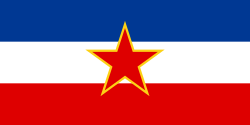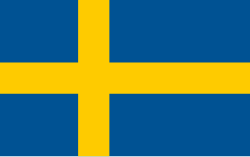Wei Qingguang
| Wei Qingguang | ||
| Bordtennis, herrar | ||
| Guld | Seoul 1988 | Herrdubbel |
| Världsmästerskap | ||
| Guld | New Delhi 1987 | Herrdubbel |
| Brons | Kuala Lumpur 2000 | Herrlag |
Wei Qingguang, född 2 juli 1962 i Nanning, Kina, är en kinesisk idrottare som tog OS-guld bordtennis i herrdubbel 1988 i Seoul tillsammans med Chen Longcan. Han bytte senare nationalitet och namn till Seiko Iseki.[1][2]
Referenser
- ^ Statistics of Seiko Iseki/Wei Qingguang Arkiverad 3 mars 2016 hämtat från the Wayback Machine.. ITTF Database
- ^ [1]
| ||||||||
Media som används på denna webbplats
De olympiska ringarna, med genomskinlig bakgrund.
Flag of England. Saint George's cross (a red cross on a white background), used as the Flag of England, the Italian city of Genoa and various other places.
Flag of the Socialist Federal Republic of Yugoslavia (1946-1992).
The design (blazon) is defined in Article 4 of the Constitution for the Republic of Yugoslavia (1946). [1]
Flag of the Socialist Federal Republic of Yugoslavia (1946-1992).
The design (blazon) is defined in Article 4 of the Constitution for the Republic of Yugoslavia (1946). [1]
Chinese Taipei Olympic Flag. According to the official website of Chinese Taipei Olympic Committee, Blue Sky(circle) & White Sun(triangles) above the Olympic rings is neither the National Emblem of the Republic of China, nor the Party Emblem of Kuomintang (KMT), but a design in between, where the triangles do not extend to the edge of the blue circle, as registered at International Olympic Committee in 1981 and digitally rendered in 2013. Besides, the blue outline of the five-petaled plum blossom is broader than the red one. Moreover, the CMYK code of the blue one and the Blue Sky & White Sun is "C100-M100-Y0-K0", and different from the Olympic rings (C100-M25-Y0-K0). Note that it's the only version recognized by IOC.











